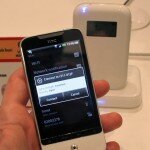I recently visited the WiMAX Forum Congress Asia 2010, in Taipei, to see the latest innovations in a mobile technology surprisingly few people know about. For example – I had no idea that Taipei had a complete coverage of WiMAX in every major city now, and you can even buy day, week or month passes for mobile internet anywhere in the capital city!
Apart from the WiMAX enabled smartphones and notebooks you can read about in my other post here, the most ingenious product that caught my eye was a battery powered WiMAX to WiFi device.
Drop it in a bag or your car and then any WiFi enabled device – like an notebook, ASUS EeePC, iPod Touch, iPad or ZuneHD (I’m just taking the popular choices here) – can get access to the internet just as with any 3G enabled Smartphone such as an iPhone, HTC or Nokia, only without an expensive data contract!
The portable palm sized box gives about three to five hours life, depending on manufacturer, or it can be charged via any USB connection. It works by connecting to the external WiMAX network and then converting that connection into a standard WiFi one that can be accessed within a few meter radius, so you can even share the connection with co-workers or friends.
Its obvious advantage is that you don’t need to start buying WiMAX enabled devices, whereas WiFi is in virtually every mobile product sold today.
The benefit of WiMAX specifically is that it’s a data-only network, unlike 3G or 3.5G GSM where data is set to a lower priority than voice and messaging services. Currently utilitisation is also low so speeds are phenomenally good and webpages load as fast as any home WiFi connection could offer.
While much of Asia is currently seeing some form of WiMAX rollout, only central US is likely to get it because of the large distances between communities. Coastal USA and most of Europe is unlikely never to get this mobile opportunity because of the strong presence of traditional GSM infrastructure and cable or fibre services unfortunately.
If you do a lot of traveling, especially to Asia, then check out if WiMAX is available in the countries you are visiting because it could certainly be cheaper and faster than relying on roaming GSM services.



